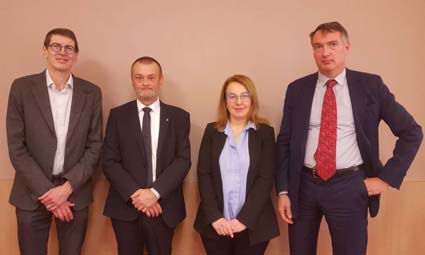In early March a.c. an important delegation of the Directorate General of Democracy within the Council of Europe was in Romania for a series of GRETA meetings (Group of Experts on Action against Trafficking in Human Beings). The delegation was led by Mr Frédéric Kurz - Deputy Prosecutor General, Ministry of Justice, Belgium; Ms Ia Dadunashvili - Member of GRETA and Mats Lindberg - Administrator at the Council of Europe. The meetings were organized in Bucharest with the following topics: new ways of human trafficking, the legal framework for combating the phenomenon, the strategy to be followed for preventing and combating human trafficking, institutions, responsibilities and resources.
Representatives of all institutions involved in preventing and combating trafficking in human beings from Romania participated in the meetings, for example representatives of: Ministry of Justice, Ministry of Internal Affairs, Ministry of Foreign Affairs, Ministry of Health, Ministry of National Education and Research, Crime Investigation Directorate Organized and Terrorism within the Prosecutor's Office - DIICOT, the People's Advocate and representatives of partner civil society organizations in the fight against human trafficking.
The EuroDEMOS and Kasta Morrely Associations were represented at meetings by Mr. Morel Bolea - Founding President of EuroDEMOS and Mrs. Diana Gabriela Alexandroae - President of the Kasta Morrely Association. We remind you that the EuroDEMOS Association is a human rights association with 30 years of civic activity, which in the last 20 years has managed to make an internationally recognized contribution in anticipating and combating human trafficking. The EuroDEMOS association has been conducting a study for several years on activities, events and festivals in the field of fashion and creative industries around the world. The research team thus discovered the existence of modern human trafficking that takes place through modeling agencies and that develops freely internationally amid general ignorance of the legality of activities specific to the field. At the suggestion of the competent authorities, to support the anticipation and fight against modern trafficking in human beings, EuroDEMOS used this study to design and legalize the draft national standards for the first time in the world for mannequin occupation (2005) and for Show Organizer (2006 ). This was followed by the writing of the first specialized manuals in the field, the development of the Anti-Modern Traffic Center and all the events developed in support of informing young people who may fall victim to this scourge.
The international representatives present in Bucharest reported the endemic corruption and the alleged complicity in human trafficking offenses of government officials, especially officials who exploited minors in state placement centers and acted in complicity with traffickers. The need to amend the legislation to allow the authorities to sanction recruitment agencies for trafficking offenses was also noted. Online recruitment and the risks associated with the misuse of resources available on the Internet are also topics to be addressed in anti-trafficking campaigns, with an emphasis on identifying solutions for the state to financially compensate victims of trafficking. Thus, each awareness campaign must be based on recently identified trends in human trafficking. Furthermore, changes to the Criminal Code have been addressed, which could reduce the police's ability to gather evidence in various types of criminal investigations, including trafficking in human beings. The legal provisions regarding the early retirement of police officers have led to the retirement of 30% of staff, as a result of overworked police officers have come to handle several cases simultaneously and struggle to generate strong cases for prosecutors. Civil society representatives noted that many police officers and judges lack the specialized training and sensitivity needed in cases of trafficking in human beings for the purpose of sexual exploitation and in human trafficking issues, including a basic understanding of trafficking in human beings and adapted training courses. to new changes in the human trafficking market. In conclusion, Romania remains the main source country for trafficking victims of men, women, children for the purpose of sexual exploitation and forced labor in Europe. Romanian women and children are victims of trafficking for sexual exploitation in Romania and other European countries. There has been an increase in the number of women in Romania recruited for false marriages in Western Europe, the purpose being prostitution or labor exploitation. Minors constitute about 50% of the total number of victims identified in Romania.
The representatives of EuroDEMOS and Kasta Morrely also emphasized the good collaboration with local, national and international authorities, offering the present partner organizations ways to communicate in order to facilitate the strengthening of the civil society partnership with the competent authorities and institutions. Following the visit, GRETA will prepare a draft report that will be sent to the Romanian authorities for completion. GRETA will subsequently adopt a final report, which will be published in early 2021.
Source: Informatorul Moldovei



